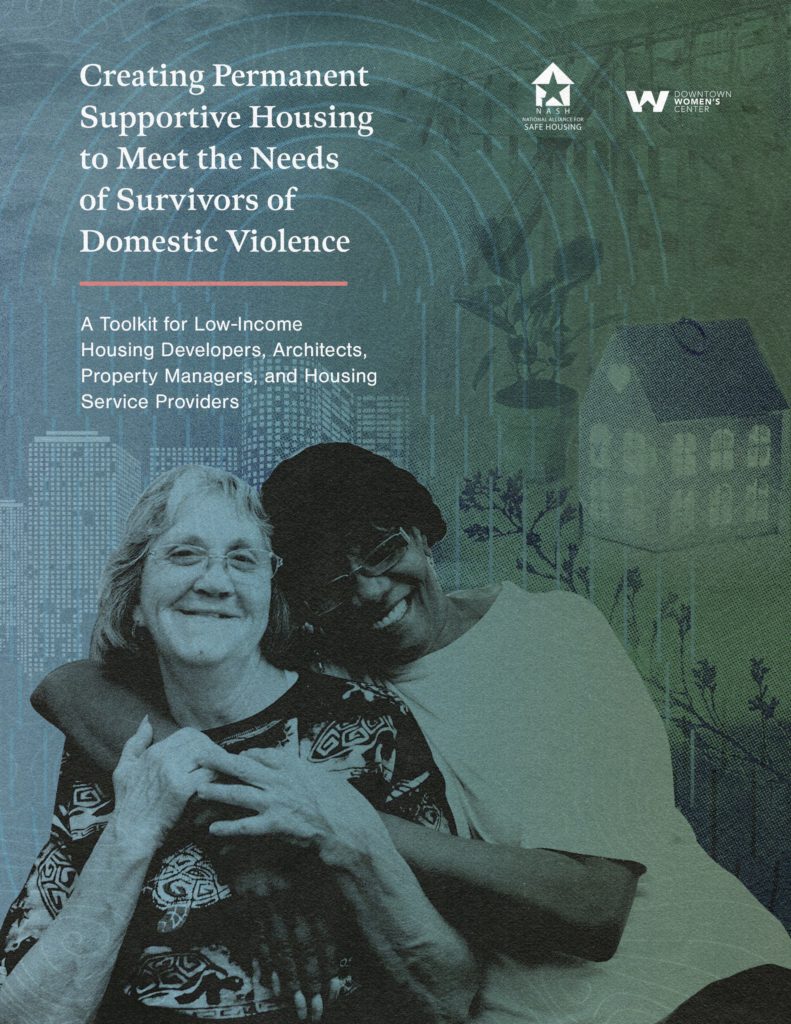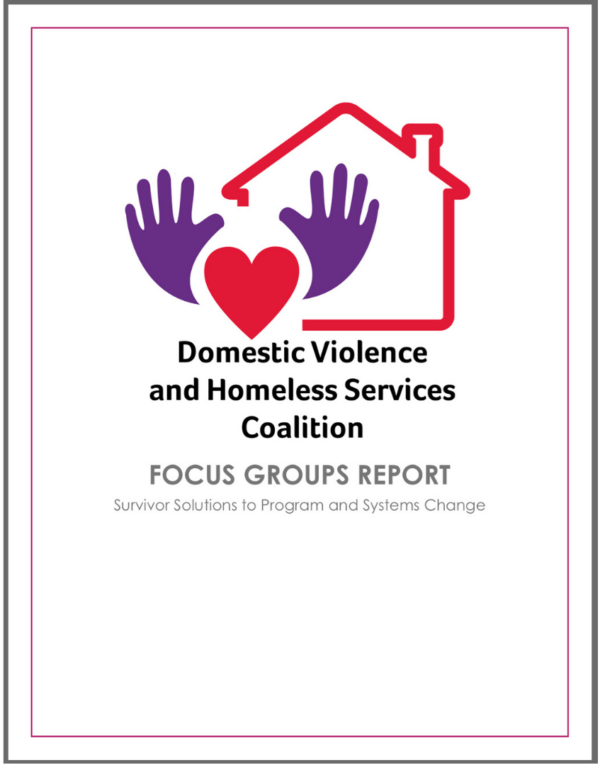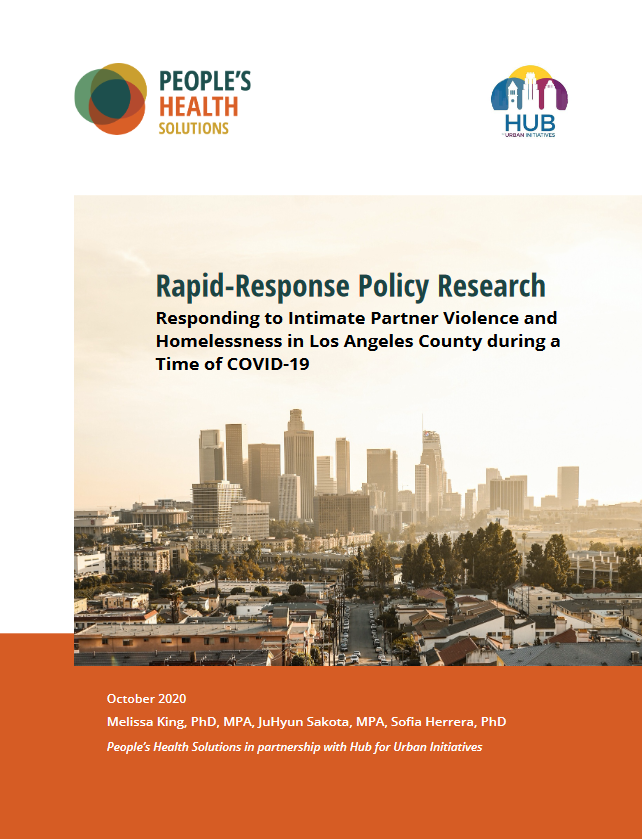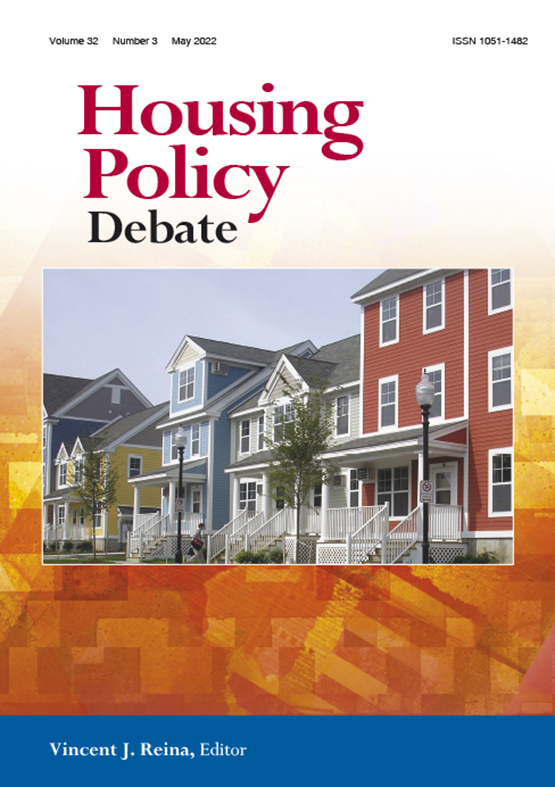
Supportive Housing for Trauma Survivors
Creating Permanent Supportive Housing to Meet the Needs of Survivors of Domestic Violence: A Toolkit for Housing Developers, Architects, Property Managers, and Housing Service Providers
This Toolkit was made possible thanks to the insight of community partners and survivors of domestic violence and homelessness. Click here to view the complete 4-part webinar series.
ABOUT THE TOOLKIT
Despite previous research showing that more than one-third (38%) of domestic violence survivors experience homelessness at some point in their lives, there has remained a dearth of public guidance on housing solutions that meet their specific needs.
To remedy this gap, the Downtown Women’s Center and the National Alliance for Safe Housing partnered in 2019 to develop this Toolkit as a best practice resource for housing developers, property managers, and service providers involved in building and operating Permanent Supportive Housing (PSH) for survivors of domestic violence (DV).
First conceptualized in meetings of the Domestic Violence & Homeless Services Coalition (DVHSC), the Toolkit incorporates unique perspectives from architects, service providers, housing developers, property managers, and survivors themselves from across the U.S., in order to serve those currently operating PSH as well as those exploring the creation of new PSH buildings and programs. As the first of its kind, the Toolkit also includes recommendations for involving survivors in the development of more inclusive, trauma-informed PSH programs, to better meet the need for effective permanent housing options in addition to shelter, transitional housing, and rapid re-housing models.
While intended as a reference for individuals building and operating PSH for DV survivors, the Toolkit’s recommendations are applicable across PSH programs and partnerships that serve or will serve trauma survivors, even if units are not specifically designated for survivors of DV.
Topics addressed in this Toolkit include:
- The implementation of trauma-informed care in PSH building and program design.
- Considerations around serving survivors of color and survivors with other intersectional identities.
- Avenues for developing long-term, sustainable dialogues with survivors regarding PSH design and operation, in order to create programs that more effectively respond to their unique needs, challenges, and perspectives.
- The cultivation of strategic partnerships and community support in PSH development, as well as the identification of key funding sources.
- Considerations for responsive and effective property management, with information on leasing policies, legal housing protections, and safety, security, and confidentiality risks.

Survivor Solutions for Programs & Systems Change
Focus Groups Report: Survivor Solutions to Program & Systems Change
This report is brought to you by the Domestic Violence & Homeless Services Coalition, with support from survivors across Los Angeles County.
ABOUT THE REPORT
In 2017, the DVHSC conducted 12 survivor-driven focus groups to better understand the barriers they faced in accessing and maintaining permanent housing, with the goal of distilling actionable recommendations for service providers across Los Angeles and the greater U.S.
Key findings from the focus groups included the following:
- A myriad of barriers exist to accessing services, leading to survivors’ feelings of hopelessness, re-traumatization, and disconnection.
- Survivors need support and advocacy in navigating the complex housing continuum and service system.
- Survivors have a deep desire to stay connected to their communities and social networks, especially those with children.
- Access to trauma-informed services and safe housing can lead to increased self-trust and trust in the system for survivors.

Intimate Partner Violence and Homelessness in LA County During COVID-19
ABOUT THE REPORT
The COVID-19 pandemic has led to an exacerbation of intimate partner violence and conditions that put women fleeing violence at risk of homelessness. COVID-19 has created unprecedented challenges for responders and a need for solutions to promote safety for this highly vulnerable population. A rapid-response policy research study in Los Angeles County, California, uplifts survivors and service providers to identify funding, policy, and service strategies to enhance response systems and keep survivors safe.

Increasing Safe Housing Access Through Systems Change
An Evaluation of the Los Angeles Domestic Violence Regional Coordinator Program
ABOUT THE REPORT
Homelessness and domestic violence (DV), sexual assault (SA), and human trafficking (HT) are deeply related issues, especially for women (LAHSA, 2017). Despite compelling evidence about the significant overlap between these experiences, homelessness and DV/SA/HT service delivery systems have traditionally operated distinctly from one another. Consequently, survivors seeking services from DV/SA/HT systems cannot readily access housing resources. In contrast, survivors seeking services from the housing and homelessness (H/H) services system may not receive help with their safety concerns or trauma symptoms.